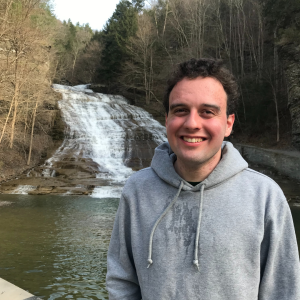ALOE Lab Principal Investigator Adriane Lam
Dr. Adriane Lam began her education at Reynolds Community College in Richmond, VA where she found a love of all things fossils. She transferred to James Madison University in Harrisonburg, VA, where she met and worked with Dr. Kristen St. John on a project conducting a planktic foraminiferal biostratigraphy on a core from the Gulf of Mexico. It was here, at JMU and in Kristen’s Paleoceanography course, where she found out about IODP and fell in love with the idea of sailing at sea. As part of her undergraduate research, she went to UMass Amherst to work in the lab of Dr. R. Mark Leckie performing stable isotopic analyses. Adriane attended Ohio University to work on her MS degree with Dr. Alycia Stigall. Here, she conducted research on fossil invertebrates in the Ordovician, and used phylogenetically-informed paleobiogeography to reconstruct animal movement through time. She then went onto UMass Amherst to complete her PhD with Dr. R. Mark Leckie, where she specialized in micropaleontology, paleoceanography, and science communication. It was at UMass that Adriane and college Dr. Jennifer Bauer started the now non-profit organization, Time Scavengers. Adriane began as a postdoctoral fellow at Binghamton University in January 2020, and since she loved the department and the feeling was mutual, she was able to stay on as an Assistant Professor in the department, a role she started in January 2023.
Adriane still works in the realms of paleobiogeography in both shallow and deep time, with both invertebrates and microfossils. She is also a paleoceanographer who specialized in reconstructing surface ocean conditions in the mid-latitude regions. Adriane is still heavily involved with science communication through the Time Scavengers organization, and teaches seminars related to scicomm.
Graduate Researchers

Alex Corsello graduated in Spring 2023 with an Geology/Biology double-major. Currently, he is a Binghamton University MAT Secondary Earth Science Education Candidate. Alex is using sediments from International Ocean Discovery Program Expedition 371 to conduct a stable isotope paleoecology study for the planktic foraminiferal species Globoquadrina dehiscens. Alex’s interval of interest spans across the Miocene Climate Optimum and Middle Miocene Climate Transition.

Jeanette deCuba is a PhD student in Earth Sciences, and the newest graduate student to join the ALOE Lab! Jeanette is working with sediment cores drilled decades ago from the southeast Indian Ocean as part of a sediment drift. She will use qualitative and quantitative geochemical and micropaleontological techniques to infer change of the water masses in the region (surface ocean temperature, salinity, productivity, and bottom water redox conditions) across super interglacials of the Pleistocene.

Gretl King is a PhD student in Earth Sciences, and the newest graduate student to join the ALOE Lab! Gretl has been accepted to sail on IODP Expedition 406 off the coast of New England (on pause for now). Gretl is conducting research on the taxonomy of the planktic foraminferal genus Globoconella through the Late Neogene. She will also be involved with research from IODP Expedition 403, sailing in Summer 2024, where sediments will be drilled from the northeast coast of Greenland.

Ravi Kiran Koorapati is a PhD student in Earth Sciences. He is using sediments from International Ocean Discovery Program Expeditions 390/393 in the South Atlantic to investigate surface ocean behavior across the Miocene Climate Optimum and Middle Miocene Climate Transition within an oligotrophic gyre. Ravi is taking a multi-proxy approach to quantify surface ocean temperatures and salinity, and using qualitative geochemical techniques to further investigate Hadley Cell dynamics across the warming and cooling event. Ravi will be sailing with IODP Expedition 402 to the Mediterranean during Spring 2024 as a planktic foraminiferal biostratigrapher.
Undergraduate Researchers

Michael Kashinsky is a Geology and English major and Evolutionary Studies minor. Michael helped renovate the Earth Sciences paleontology hallway displays at Binghamton University, infusing the displays with his creativity. On the research front, Michael is identifying citations to scientific ocean drilling publications in the IPCC 2021 reports. In this way, Michael will be able to communicate better the importance of scientific ocean drilling to climate change research and repots to aspects of the general public and policy makers.

Sofia Corsico-Sanchez is a Biology major and Geology minor. She is using sediments from Ocean Discovery Program Leg 198, which drilled cores from the northwest Pacific Ocean. Sofia is conducting a planktic foraminiferal assemblage analysis to infer changes in the Kuroshio Current Extension across the mid-Piacenzian Warm Period.

Zack Voss is a Geology major and GIS minor. He is using sediments from International Ocean Discovery Program Expedition 371 to quantify sizes of planktic foraminifera across the Miocene Climate Optimum and Middle Miocene Climate Transition, and if orbital factors influence changes in sizes at the genus to species levels. Zack has presented research from his time as a First Year Research student, where he and a team of other students used ICP-OES data, compared to XRF data, from Site U1510 to infer changes in terrigenous input over the site through the Middle Miocene.
Lab Alumni

Charlotte Heo graduated in Spring 2023 with her MS student in Biology. She used sediments from Ocean Drilling Program Leg 198 to reconstruct the Kuroshio Current Extension across the mid-Piacenzian Warm Period. Charlotte used planktic foraminiferal stable isotopic analyses to investigate the current’s behavior, as well as investigating how species’ seasonality affect interpretations of surface ocean reconstructions. She is currently working on a manuscript resulting from her thesis research. Stay tuned!
